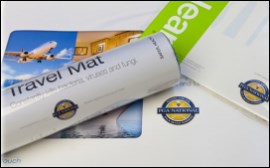by Brianna Crandall — September 25, 2013—Safe Life FZC, a new type of healthcare distributors based in the United Arab Emirates (UAE) and distributing state-of-the-art technologies and products to the Middle East and Africa, is employing the latest technology to combat dangerous outbreaks like the deadly Middle East respiratory syndrome coronavirus (MERS-CoV), including attempting to break the cycle of transmission by adopting newly developed self-cleaning NanoSeptic surfaces for use throughout hospitals, hotels, shopping centers and schools. The NanoSeptic products serve as visible evidence of a company, school or organization’s concern for its clients, students, customers and employees.
NanoSeptic surfaces are engineered with a proprietary blend of material science, nanotechnology and green chemistry to create a super-hydrophilic surface with antimicrobial properties. The result is a nontoxic surface that constantly kills bacteria, viruses and fungi, without contributing to antimicrobial resistance and without the use of toxins, heavy metals or diluted poisons. The NanoSeptic self-cleaning products are designed to cover facility touch points such as door push pads and handle wraps, and serve as portable mats for counters, tray tables and bathroom vanities, as well as custom products like grocery cart and public transportation grab-handle wraps. The products can also be branded for a specific facility or as a promotional item.
“When you are talking about a virus that has a 50% mortality rate and is spreading internationally, we need to attack the problem on multiple fronts,” says Dr. Ahmed Elawadi, President of Safe Life. “Not only do NanoSeptic surfaces help to inhibit the chance of coronavirus transmission through surface contact and cross contamination, but it works on all other bacteria, viruses and fungi.”
Independent lab tests were just conducted with the human coronavirus that reportedly show that the NanoSeptic surface kills 99.96% of viruses deposited on a surface in 30 minutes. The same tests showed that after 30 minutes, 56% of the virus was still alive on a stainless steel surface, a common material for door push plates and handles, and almost 20% was still alive after 4 hours. And unlike sanitizers and disinfectants which are one-time kills, the NanoSeptic surface is “always on,” constantly trapping and killing microbes 24/7.
“We are always on the lookout for innovative solutions for our healthcare and hospitality clients,” says Walter Bone, architect based in Dubai. “NanoSeptic self-cleaning surfaces could help our clients stay ahead of the curve with the cleanliness of their properties and the health of their guests. The timing is perfect with the large number of 5- and 6-star hotels as well as international travelers coming to the region for the upcoming Hajj Pilgrimage.”

This peace of mind also extends to the environment, since NanoSeptic surfaces use no toxins, heavy metals or diluted poisons, and do not contribute to antimicrobial resistance. NanoTouch Materials co-founders Dennis Hackemeyer and Mark Sisson say they are not out to create a sterile world, but have embraced a focused approach, enabling cleaner surfaces to exist exactly where and when they are needed. “NanoTouch is out to make the world a cleaner and healthier place to live, work, and play. This is particularly important when dangerous outbreaks occur in the very facilities where we go to get better,” says Hackemeyer, a former Marine. “The NanoTouch slogan is really our mission: ‘Cleaner Surfaces for a Healthier World.'”
Lynchburg, Virginia-based NanoTouch Materials is the “world’s first and only” manufacturer of NanoSeptic products that constantly kill bacteria, viruses, and fungi. NanoTouch serves the international business, hospitality, travel, education, and food service industries with products such as computer mouse pads, travel mats, counter and tray table mats, TV channel guides, and menu covers, in addition to facility touch points.




